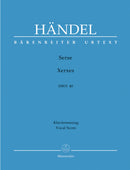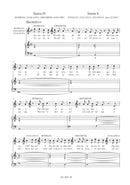| 作曲者 | George Frideric Handel (1685-1759)・ジョージ・フリデリック・ヘンデル |
| タイトル | Serse - Xerxes HWV 40 (ヴォーカル・スコア) |
| サブタイトル | Opera in 3 acts |
| 出版社 | Bärenreiter・ベーレンライター |
| シリーズ名 | BÄRENREITER URTEXT |
| 楽器編成 | Soloists, Orchestra |
| 楽器編成(詳細) | 3SSolo/MezSolo/ASolo/2BSolo/Orch |
| 品番 | 9790006526987 |
| 校訂者 | Terence Best |
| 編曲者 | Andreas Köhs |
| 言語 | イタリア語、ドイツ語 |
| 形状 | XIX,231 ページ・27.0 x 19.0 cm・693 g・ソフトカバー |
| 出版年 | 2016年第4刷 |
| 出版番号 | BA 4076-90 |
| ISMN | 979-0006526987 |
Handel started writing " Serse " on 26 December 1737 and completed the third act on 6 February 1738. The premičre took place on 15 April of the same year at the King's Theatre in the Haymarket. Four performances followed, after which the work was not heard again until 1924.
The opera focuses on the Persian king Serse, who, rather than serving as a military commander or statesman, appears at the centre of a highly complex love story. Handel provided an admixture of buffo elements (the antics of the servant Elviro, the stupidity of the soldier Ariodate ) to the standard ingredients of opera seria, such as the broadly declaimed woes of Serse, Romilda, Arsamene, and Amastre.
This interweaving of seemingly incompatible stylistic resources arose in Naples and can already be found in the 17th century librettos that served as the principal sources of Handel's Serse.
Though unsuccessful at the time, today " Serse " is prized precisely for its comic undertones and is regularly seen on stage.
Our new Urtext vocal score is based on the volume edited by Terence Best for the "Halle Handel Edition" (series II/volume 39).





